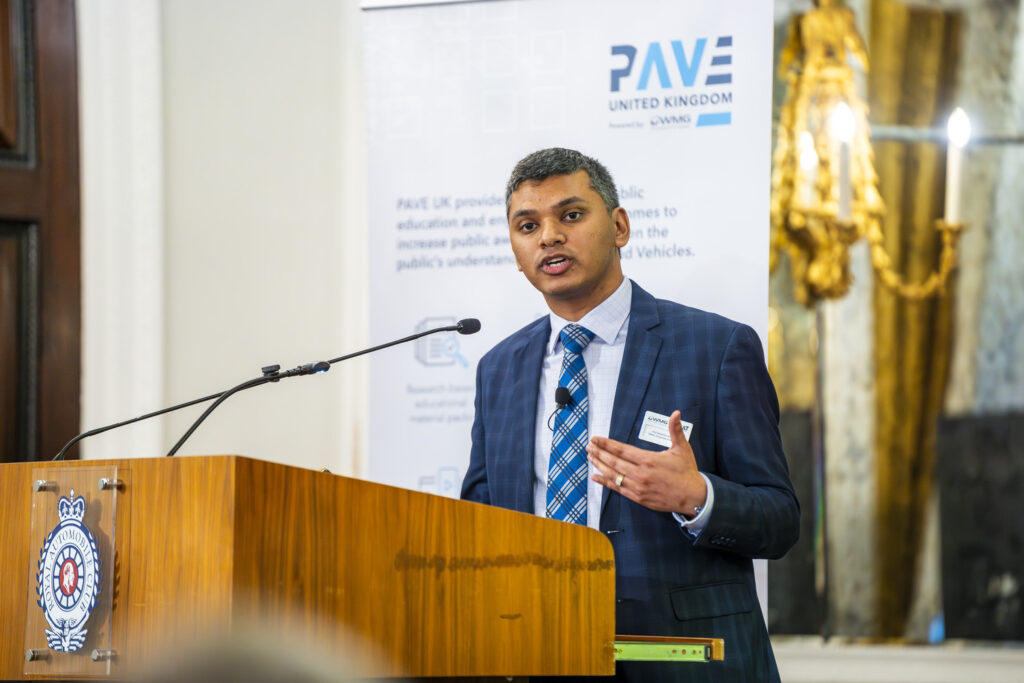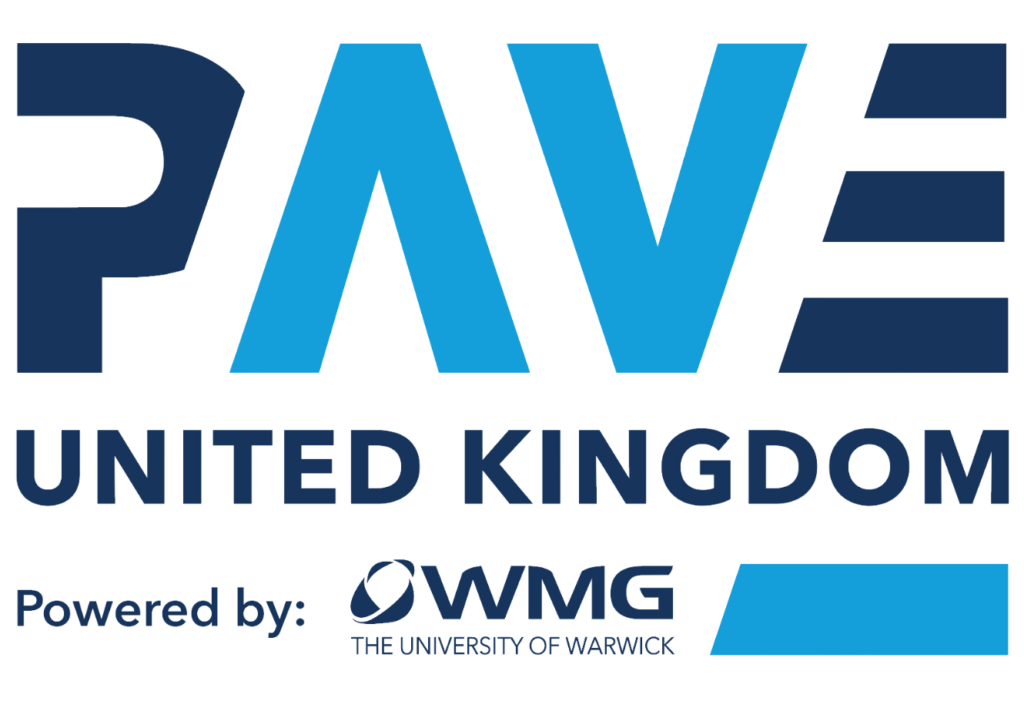Today (Wednesday 21st February 2024), WMG at The University of Warwick, has launched the Partners for Automated Vehicle Education United Kingdom (PAVE UK) with the Department for Business and Trade, the Department for Transport, the Centre for Connected and Autonomous Vehicles (CCAV), and Transport for West Midlands, as its founding partners.
The PAVE UK initiative aims to build public confidence in self-driving technology through a programme of education and engagement, supporting the UK Government’s ambition to safely deploy self-driving vehicles on the road and its aim to make the UK the leader in artificial intelligence (AI).
PAVE UK is the country’s first non-governmental organisation that advocates for and delivers public education and engagement programmes on automated vehicles. It launched today at the Royal Automobile Club in London, with Anthony Browne MP (Technology and Decarbonisation Minister), and Professor Sarah Sharples (Chief Scientific Adviser at the Department for Transport), as the keynote speakers. Over 100 technology developers, safety campaign groups, regulators, innovators, and industry leaders discussed how to ensure the public is engaged in the self-driving technology journey and how to accurately communicate AV safety messages with different stakeholders in society.

Professor Siddartha Khastgir, Head of Safe Autonomy at WMG, University of Warwick said: “At WMG, we strive to enhance the safety of self-driving technology and ensure it is safe to operate on the roads. In taking a people first approach, the public should be paramount in the safety conversation and part of the journey during the development and deployment of self-driving vehicles on UK roads.
“PAVE UK will translate technical information into clear, comprehensive and accurate messaging to help communicate safety to the public in an inclusive and accessible manner. Future technology users and other road users will be equipped with the knowledge of benefits and limits of this new transport technology. PAVE UK will also bring together the self-driving ecosystem to tackle the technological challenges, speak honestly and accurately about system capabilities and limitations, and encourage innovators to put the public at the heart of this.”
PAVE UK will work closely with the entire UK Connected and Automated Mobility (CAM) ecosystem, to carry out education and engagement programmes, such as research-based educational materials packs, school outreach activities, community outreach, an online video library, webinars, and an online educational app. The programme will be delivered by WMG at the University of Warwick.
Nusrat Ghani MP, Minister for Industry and Economic Security, said: “The UK automotive sector is at the cutting edge of exploiting new innovative technologies. These have the potential to create jobs, grow the economy and accelerate how we reach net-zero.
“This government has shown time and time again that we’re committed to creating the right conditions to boost UK advanced manufacturing, and the PAVE UK initiative will help cement the UK as a world leader in self-driving technology.”
Technology and Decarbonisation Minister Anthony Browne said: “Self-driving vehicles have the potential to transform our transport sector, and PAVE UK will be a big part of this by raising awareness and embedding confidence in people throughout the country. In the meantime, we’re making sure that these vehicles are safe to use on our roads. Our Automated Vehicles Bill sets a rigorous standard for safety, whilst making sure that this country is where businesses can develop and deploy their cutting-edge technology.”
Organisations and schools wishing to participate in the programmes can contact PAVEUK@warwick.ac.uk
Ends
Note to editors
Additional quotes
Tara Andringa, Executive Director, PAVE said: “When PAVE was founded in 2019, it was a bet on the power of knowledge: we believed that if the public understands the facts of autonomous vehicles, we will see greater public trust in this incredibly promising technology. Our campaign both seeks to demystify automated vehicles– to explain how the technology works – and to help the public understand how these technologies could help to improve the safety, efficiency, and sustainability of our transportation system.
“While countries and regions have adopted different regulatory approaches to automated vehicles, the challenge of AV education is global in nature. Given the tremendous leadership from the UK both in its approach to AV policy and to civic engagement on the technology, we are incredibly excited for the influential role PAVE UK will play in leading public education. The PAVE ecosystem is thrilled for the launch of PAVE UK, and we will work together to build an engagement campaign that will create a template for AV education worldwide.”
Automated Vehicles Bill: https://bills.parliament.uk/bills/3506
About WMG, University of Warwick
WMG is a world leading research and education group, transforming organisations and driving innovation through a unique combination of collaborative research and development, and pioneering education programmes.
As an international role model for successful partnerships between academia and the private and public sectors, WMG develops advancements nationally and globally, in applied science, technology and engineering, to deliver real impact to economic growth, society and the environment.
WMG’s education programmes focus on lifelong learning of the brightest talent, from the WMG Academies for Young Engineers, degree apprenticeships, undergraduate and postgraduate, through to professional programmes.
An academic department of the University of Warwick, and a centre for the HVM Catapult, WMG was founded by the late Professor Lord Kumar Bhattacharyya in 1980 to help reinvigorate UK manufacturing and improve competitiveness through innovation and skills development.
About PAVE UK
PAVE UK aims to bring the conversation about automated vehicles (AVs) to the public so that future users and technology developers can play a role in shaping our future.
By arranging education and engagement programmes around AVs, our goal is to increase the public’s awareness of the capabilities and limitations of the technology and build up societal acceptance and trust in this new transport innovation. We also aim to develop a correct user attitude to foster the safe deployment of AVs.
We strongly believe that by fully and transparently equipping the public with CAM technology knowledge, we could then achieve the potential benefits of the technology.
 PAVE US
PAVE US PAVE EUROPE
PAVE EUROPE PAVE UK
PAVE UK

